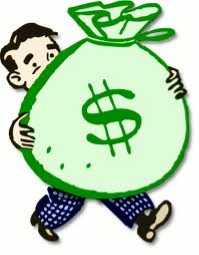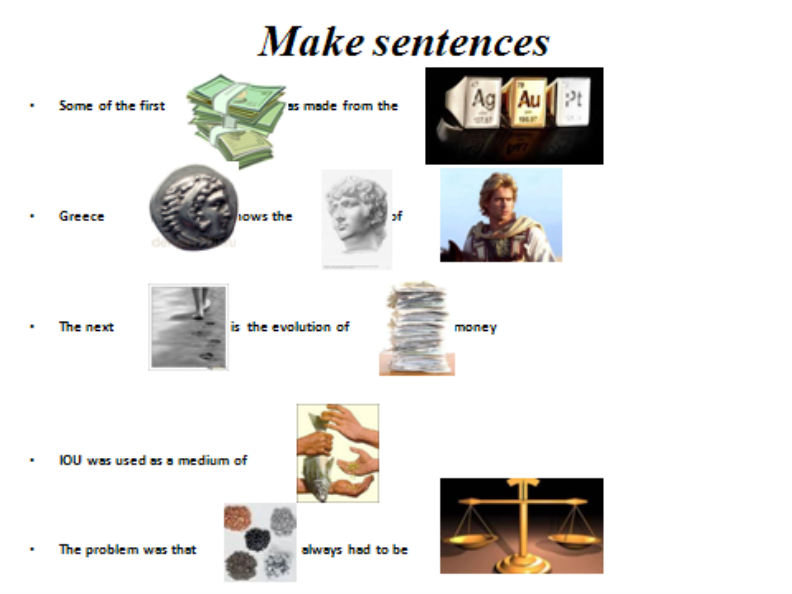Урок «Гроші. Історія виникнення грошей. Головні члени речення»
План-конспект заняття
з іноземної мови (англійської) для класів з економічним спрямуванням
на тему
«Гроші. Історія виникнення грошей. Головні члени речення»
 Підготувала:
Підготувала:
учитель
англійської мови
Чамарник М.Т.
Дисципліна: Англійська мова (за професійним спрямуванням)
Дата:
Група: 10 клас
Тема заняття: «Гроші. Історія виникнення грошей. Головні члени речення»
Мета :
практична : активізувати лексичні одиниці в межах тематики, розвивати навички усного (діалогічного і монологічного мовлення), продовжувати формувати вміння вести групову бесіду, вчити висловлювати свою думку, активізувати мовленнєві та слухові навички студентів, розвивати вміння та навички аудіювання та письма.
освітня : розширити знання студентів з теми, що вивчається, збагатити їх словниковий запас, узагальнити та систематизувати знання студентів з даної теми, розширити кругозір студентів, за рахунок інформації, здобутої за допомогою англійської мови.
розвиваюча : розвинути мовленнєві здібності студентів через мовну здогадку як важливої умови для засвоєння іноземної мови, готовність до участі в іншомовному спілкуванні, розвивати творчі здібності та пізнавальний інтерес, зорову та слухову пам'ять, логічне мислення, увагу, вміння висловлювати свою точку зору та відстоювати її.
виховна: виховувати інтерес до майбутньої професії, прагнення вдосконалювати себе, виховувати відчуття згуртованості, культуру мовлення і спілкування, повагу до співрозмовників під час роботи в групах, сприяти прагненням студентів поглибити свої знання з англійської мови.
Тип заняття: комбінований
Форма: практичне
Обладнання : картки з завданнями, тематичні малюнки, мультимедійна презентація, тестові завдання, опорні схеми, комп’ютер.
Схематичний план заняття
- Організаційний момент.
- Початок заняття. Організація групи.
- Привітання (створення іншомовної позитивної атмосфери)
- Бесіда зі студентами.
- Підготовка до сприйняття іншомовного мовлення.
- Гра «Touchpad»
- Повідомлення теми та мети заняття.
- Актуалізація опорних знань, життєвого досвіду студентів та мотивація їх навчально-пізнавальної діяльності.
- Мовленнєва зарядка (Робота над піснею)
- Основна частина.
3.1. Розвиток навичок аудіювання.
3.2. Тренування навичок читання та перекладу.
3.3. Розвиток навичок мовлення.
3.4. Перевірка домашнього завдання.
3.5. Розвиток навичок граматики.
3.6. Тренування навичок граматики.
IV. Підсумки заняття.
- Узагальнення та систематизація вивченого матеріалу
- Перевірка набутих знань (комп’ютерні тести)
- Пояснення домашнього завдання.
- Прощання зі студентами
Хід заняття
I. Організаційний момент.
Good morning dear students, how are you Helen (Olga)? Did you have fun on your weekends? What did you do? Do you ready for the lesson? Who is absent today?
II. Підготовка до сприйняття іншомовного мовлення.
2.1 Повідомлення теми та мети заняття
Today we continue speaking about economics and its constituent parts. As you know it is very important for our future profession. We will do a lot of various activities which will develop your reading, speaking, writing and listening skills.
- Answer my questions please:
- What is economics?
- What kind of economic system is in Ukraine?
- What kind of economic system was in the USSR?
- What are the differences between command and free-market economy?
- What kind of economic system can we see in practice?
- What other types of economic systems do you know?
- Individual Questionnaire
Work with cards (Додаток 1).
2.2 Уведення в іншомовну атмосферу.
Try to guess the theme of today’s our lesson
- (Гра «Touchpad»)
We will start with practicing pronunciation of English sounds by singing the song «Money, money, money»
- (Фонетична вправа на тренування навичок вимови)
(Додаток 2).
III. Основна частина заняття.
3.1.Розвиток навичок аудіювання.
We are going to watch and exercise the video “History of Money”
Pre-listening activity:
- Pay attention to the following words, write down new words into your vocabularies:
precious metals – дорогоцінні метали
to weight - зважувати
to determinate - визначати
to overcome – вирішувати, долати
coins - монети
evolution- еволюція. розвиток
invention - винайдення
goldsmith - золотники
IOU – боргова розписка
painstaking – копітка (праця)
Post-listening activity:
- Answer my questions please:
- What was first money made from?
- What was the great problem?
- How did they overcome this problem?
- Who is shown on the first Greece coins?
- What was the next step of evolution of money?
- Who were goldsmiths?
- What did they do?
- What is IOU?
- Who had become the banks?
- Make sentences (using pictures in the presentation)
- Тренування навичок читання та перекладу.
Pre-reading activity (work with a dictionary)
- Pay attention to the following words:
To store wealth
equal value
shells
portable
durable
recognizable
divisible
Money
Money is used for buying or selling goods, for measuring value and for storing wealth. Almost every society now has a money economy based on coins and paper notes of one kind or another. However, this has not always been true. In primitive societies a system of barter was used. Barter was a system of direct exchange of goods. Somebody could exchange a sheep, for example, for anything in the market-place that they considered to be of equal value. Barter, however, was a very unsatisfactory system because people's precise needs seldom coincided. People needed a more practical system of exchange, and various money systems developed based on goods which the members of a society recognized as having value. Cattle, grain, teeth, shells, feathers, skulls, salt, elephant tusks and tobacco have all been used. Precious metals gradually took over because, when made into coins, they were portable, durable, recognizable and divisible into larger and smaller units of value.
A coin is a piece of metal, usually disc-shaped, which bears lettering, designs or numbers showing its value. Coins have been made of gold (Au), silver (Ag), copper (Cu), aluminium (Al), nickel (Ni), lead (Pb), zinc (Zn), plastic, and in China even from pressed tea leaves. Most governments now issue paper money in the form of notes, which are really 'promises to pay'. Paper money is obviously easier to handle and much more convenient in the modern world. Cheques, bankers' cards, and credit cards are being used increasingly and it is possible to imagine a world where 'money' in the form of coins and paper currency will no longer be used. Even today, in the United States, many places — especially filling stations — will not accept cash at night for security reasons.
Post-reading activity:
- Exercise 1
Find English equivalents to the following words and words combinations:
- Гроші, монети, банкноти, купувати, продавати, вимірювати, спільнота, обмін, череп, пір’я, тютюн, портативні, міцні, впізнавані. У формі диска;
- Купувати і продавати товари, зберігати багатства, первісне суспільство, система бартеру, рівноцінні товари, незадовільна система, з метою безпеки.
- Exercise 2
Find expressions which mean:
A place to buy petrol.
A place where goods are bought and sold.
The period between 1801 and 1900.
The bony structure of the head.
Round and flat in shape.
An exchange of goods for other goods.
- Exercise 3
Find words which mean:
Can be divided.
Lasts a long time.
Can be carried.
Can be recognized.
- Exercise 4 (cards)
Put these words in the correct places in the sentences below: coins/cash/currency/money/ cheque.
The …of Japan is the yen.
She has got a lot of... in her bank account.
It costs Ј10 if you're paying …
It'll be more if you pay by …
Can you change this pound note into ... for the coffee machine?
3.4.Перевірка домашнього завдання.
Students’ presentations:
Student 1 «Dollar»
Student 2 «Euro»
Student «Hryvnya»
Students’ video projects
3.5. Розвиток навичок граматики.
Table 1. ”The principle parts of the sentence”

3.6. Тренування навичок граматики.
1. Money is honey.
2. Time is money.
3. Every society now has a money economy.
4. Barter was a system of direct exchange of goods.
5. The best things in life are free.
6. You can't take it with you when you die.
IV. Заключна частина заняття.
4.1. Підсумки заняття.
- Узагальнення та систематизація вивченого матеріалу
- Computer tests (Робота з комп’ютером).
4.2. Оцінювання й мотивація навчальних досягнень.
4.3.Домашнє завдання.
Додатки
Додаток 1
Variant 1.
Translate into English
|
|
|
|
|
|
|
|
|
|
|
|
|
|
|
|
|
|
|
|
Variant 2.
Translate into English
|
|
|
|
|
|
|
|
|
|
|
|
|
|
|
|
|
|
|
|
Додаток 2
I work all night, I work all day, to pay the bills I have to pay
Ain't it sad
And still there never seems to be a single penny left for me
That's too bad
In my dreams I have a plan
If I got me a wealthy man
I wouldn't have to work at all, I'd fool around and have a ball
Money, money, money
Must be funny
In the rich man's world
Money, money, money
Always sunny
In the rich man's world
Aha-ahaa
All the things I could do
If I had a little money
It's a rich man's world
It's a rich man's world
A man like that is hard to find but I can't get him off my mind
Ain't it sad
And if he happens to be free I bet he wouldn't fancy me
That's too bad
So I must leave, I'll have to go
To Las Vegas or Monaco
And win a fortune in a game, my life will never be the same
Money, money, money
Must be funny
In the rich man's world
Money, money, money
Always sunny
In the rich man's world
Aha-ahaa
All the things I could do
If I had a little money
It's a rich man's world
Money, money, money
Must be funny
In the rich man's world
Money, money, money
Always sunny
In the rich man's world
Aha-ahaa
All the things I could do
If I had a little money
It's a rich man's world
It's a rich man's world

- Answer the questions:
- Have you ever borrowed money from anyone? Who from? How much?
- Have you ever lent money to anyone?
- Who to? How much?
- Are you in a debt at the moment?
- Does anyone owe you any money?
- Do you save money?
- Are you saving anything at the moment? What?
-
Do you keep your money:
- in a bank?
- in a safe?
- in a money-box?
- under the bed?
- Do you spend more than you earn, or less than you earn? Do you have a budget for your money?
- Do you keep a record of your expenses?
-
Where do you keep your money ?
- in a purse,
- in a wallet,
- in a handbag,
- in a pocket
-
If you keep it in a pocket, which pocket do you keep it in?
- inside jacket-pocket
- back trouser-pocket
- side trouser-pocket
- top jacket-pocket
- Have you ever had your pocket picked?
- Have you bought anything this week? What?
- What did it cost?
- Was it worth it?
- Was it new or second-hand?
- Was it a bargain? Did you get a receipt?


про публікацію авторської розробки
Додати розробку
